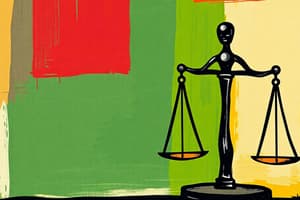Podcast
Questions and Answers
What is the primary focus of the law of persons?
What is the primary focus of the law of persons?
The legal status and capacities of individuals and groups.
What are the three characteristics of a natural person?
What are the three characteristics of a natural person?
Capacity to acquire rights and duties, capacity to enter into contracts and obligations, and liability for crimes and torts.
What is the legal status of a minor?
What is the legal status of a minor?
Limited legal capacity, requiring a guardian or representative.
What is a juristic person?
What is a juristic person?
What is the main characteristic of a corporation as a juristic person?
What is the main characteristic of a corporation as a juristic person?
What is capacity in the context of the law of persons?
What is capacity in the context of the law of persons?
What are the consequences of incapacity?
What are the consequences of incapacity?
What is domicile in the context of the law of persons?
What is domicile in the context of the law of persons?
How does residence affect a person's legal obligations?
How does residence affect a person's legal obligations?
What is the key difference between domicile and residence?
What is the key difference between domicile and residence?
Flashcards
Law of Persons
Law of Persons
Deals with an individual's legal standing, covering rights, duties, and responsibilities.
Natural Person
Natural Person
A human being with a distinct identity recognized under the law.
Juristic Person
Juristic Person
An entity, like a corporation, with separate legal rights from its members.
Legal Capacity
Legal Capacity
Signup and view all the flashcards
Domicile
Domicile
Signup and view all the flashcards
Residence
Residence
Signup and view all the flashcards
Foreigners
Foreigners
Signup and view all the flashcards
Minority (Legal)
Minority (Legal)
Signup and view all the flashcards
Mental Incapacity
Mental Incapacity
Signup and view all the flashcards
Study Notes
Definition and Scope
- The law of persons deals with the legal status and capacities of individuals and groups.
- It encompasses the rights, duties, and responsibilities of natural and juristic persons.
Natural Persons
- A natural person is a human being with a distinct identity and legal personality.
- Characteristics:
- Capacity to acquire rights and duties
- Capacity to enter into contracts and obligations
- Liability for crimes and torts
- Status of natural persons:
- Majority ( adult ): full legal capacity
- Minority ( child ): limited legal capacity, requires guardian or representative
- Insanity or mental incapacity: limited or no legal capacity
Juristic Persons
- A juristic person is a non-human entity with legal personality, such as a corporation or organization.
- Types of juristic persons:
- Corporations (companies, partnerships)
- Associations (NGOs, charities)
- Government entities (states, municipalities)
- Characteristics:
- Separate legal identity from its members
- Can own property, enter into contracts, and sue/be sued
- Limited liability for members
Capacity and Incapacity
- Capacity refers to the ability of a person (natural or juristic) to enter into legal transactions and be held liable for their actions.
- Incapacity refers to the lack of capacity, often due to minority, insanity, or mental incapacity.
- Consequences of incapacity:
- Void or voidable contracts
- Limited or no liability for torts or crimes
Domicile and Residence
- Domicile: a person's permanent home or fixed abode, which determines their personal law and jurisdiction.
- Residence: a person's temporary or permanent place of stay, which may affect their tax liability, voting rights, and other legal obligations.
- Importance of domicile and residence:
- Determines jurisdiction and applicable law
- Affects tax liability, voting rights, and other legal obligations
Status of Foreigners
- Foreigners: individuals who are not citizens of the country in which they reside or operate.
- Legal status of foreigners:
- May have limited rights and capacities compared to citizens
- May be subject to immigration laws and regulations
- May require special permits or licenses to work or conduct business
Definition and Scope
- Law of persons deals with the legal status and capacities of individuals and groups, covering rights, duties, and responsibilities of natural and juristic persons.
Natural Persons
- A human being with distinct identity and legal personality.
- Characteristics:
- Acquire rights and duties
- Enter into contracts and obligations
- Liable for crimes and torts
- Status:
- Majority (adult): full legal capacity
- Minority (child): limited legal capacity, requires guardian or representative
- Insanity or mental incapacity: limited or no legal capacity
Juristic Persons
- Non-human entity with legal personality (e.g., corporation, organization).
- Types:
- Corporations (companies, partnerships)
- Associations (NGOs, charities)
- Government entities (states, municipalities)
- Characteristics:
- Separate legal identity from members
- Own property, enter into contracts, and sue/be sued
- Limited liability for members
Capacity and Incapacity
- Capacity: ability to enter into legal transactions and be held liable.
- Incapacity: lack of capacity, often due to minority, insanity, or mental incapacity.
- Consequences of incapacity:
- Void or voidable contracts
- Limited or no liability for torts or crimes
Domicile and Residence
- Domicile: permanent home or fixed abode, determining personal law and jurisdiction.
- Residence: temporary or permanent place of stay, affecting tax liability, voting rights, and other legal obligations.
- Importance:
- Determines jurisdiction and applicable law
- Affects tax liability, voting rights, and other legal obligations
Status of Foreigners
- Foreigners: individuals not citizens of the country they reside in or operate in.
- Legal status:
- Limited rights and capacities compared to citizens
- Subject to immigration laws and regulations
- May require special permits or licenses to work or conduct business
Studying That Suits You
Use AI to generate personalized quizzes and flashcards to suit your learning preferences.



